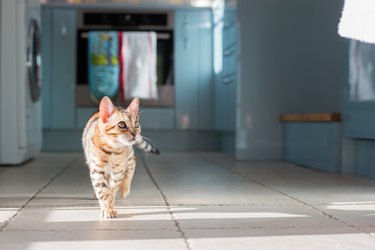
There are a few unpleasant smells and cat urine is definitely one of them. While we love our cats unconditionally, dealing with the litter box may not be one of the activities related to cats that we love the most. If a cat has decided that she doesn't want to "go" in the litterbox, and if she is spraying to mark her territory, or if you move into a house where there were previous cats, you may have a powerful smell to deal with.
Spraying versus urinating
Video of the Day
First of all, let's make a distinction between the signs of cat spraying and urinating, and not using the litter box. The way that Cat Behavior Associates explains it, urinating outside of the litter box is usually done on a flat surface, whereas spraying is often done on vertical objects — a wall or fence post, for example.
Video of the Day
Indiscriminate urinating is often a sign of a medical condition. It can also be a sign that the cat does not like the litter box for some reason. Reasons for not liking the litter box can be that it is too small, or for some reason they do not feel safe in it. Some cats like covered litter boxes and some don't. Experiment to see what the issue might be for your cat, or get him checked out to be sure there's not an underlying medical issue that is making urinating uncomfortable.
Why cats spray
Territory marking is one major reason why cats spray, and it's often the non-neutered male cat who does this. Neutering or spaying a cat will usually stop them from wanting to spray. Sometimes, though, a neutered male cat will still spray. When a cat sprays, it's a form of communication that provides other cats with information through scent. The chemical scents of spray reveal whether the cat was a male or female and what their territory range is.
Cats may spray out of anxiety. While it may make you upset if your cat sprays on your clothes or bed, Cat Behavior Associates say that this can actually be a sign of bonding because it mingles your scent with that of your cat. Whatever the causes of cat spraying are, it leaves a powerful smell behind.
Cat urine cleaner
The cat spraying smell is caused by the uric acid in cat urine, which has a strong smell. Unfortunately, that smell can linger in wood, carpets, and anything that absorbs it. House Cleaning Central provides some recipes for homemade cat urine remover. White vinegar is a good option because it is a natural deodorizer, and it's non-toxic.
To use white vinegar to deodorize, first blot or soak up as much of the cat pee as you can, and saturate the area with white vinegar. Let it sit and then vacuum it up with a wet vac or blot up with paper towels. House Cleaning Central says that contrary to what many Internet sites promote, using vinegar and baking soda together doesn't really work as a cat urine cleaner. Hills Pet says that vinegar, soap, and hydrogen peroxide may neutralize the urine odors temporarily, but the crystals of uric acid that cause the smell can sometimes recrystallize, leading to the return of the cat spraying smell.
The uric acid can be broken down by an enzyme cleaner, which releases the uric acid as gases that will eventually dissipate. Enzyme cleaners can be purchased at pet stores and even some grocery stores, or online. If you're having trouble finding one, check with your vet on what she recommends.
Hard surfaces and walls
Hardwood Champion explains how to remove the cat spraying smell from wood, such as a wood floor or a piece of furniture. Again, vinegar is given as an option. To use it, dilute a cup of vinegar into a bucket of warm water and mop as you usually would. The vinegar smell will evaporate and hopefully take with it the urine odor.
Sprinkle baking soda on the floor and let it sit. Baking soda often absorbs unpleasant odors. You can also make a paste by mixing the baking soda with water. Hydrogen peroxide can be used in a similar way as the vinegar by simply pouring it on the area, and then wiping it up. One other option is bleach, although Hardwood Champion says to be cautious with this option as you can bleach out your wood.
To use bleach, mix one part bleach and one part water and mop as you normally wood. When cleaning cat spray off walls, put your solution into a spray bottle and let it sit for a bit before wiping it up.
House Cleaning Central cautions about using vinegar on marble or stone, as this will damage those materials. Vinegar can be used successful on ceramic, tile, and linoleum.